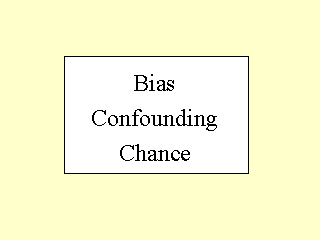 |
A single case control or cohort study may have findings that
do not stand up. This may the result of a bias or confounding
or chance—the three concerns to be addressed when planning a
study. Bias occurs when there is an error in how the study
is conducted (there are plenty of ways this can occur including
asking the wrong questions, asking the right questions in the
wrong way, failing to get an appropriate control group, failing
to achieve adequate follow up, etc.). Confounding is when there
is a hidden factor which is the real problem rather than the one
identified For example, a relationship between drinking alcohol
and lung cancer can occur because alcohol and smoking often go
together and smoking can cause lung cancer. In this case,
smoking is the confounder. Chance can be because the sample
is too small or because the population chosen for study is not
typical. For example, it may be that the study was conducted
on a group of people who were different in some way from people
elsewhere.
This means that the studies are called hypotheses-testing
studies, not hypotheses proving. Other such studies on different
groups of people, preferably using both case control and cohort
methodologies, need to be done in the hope that the results of
the first study will be confirmed.
|
